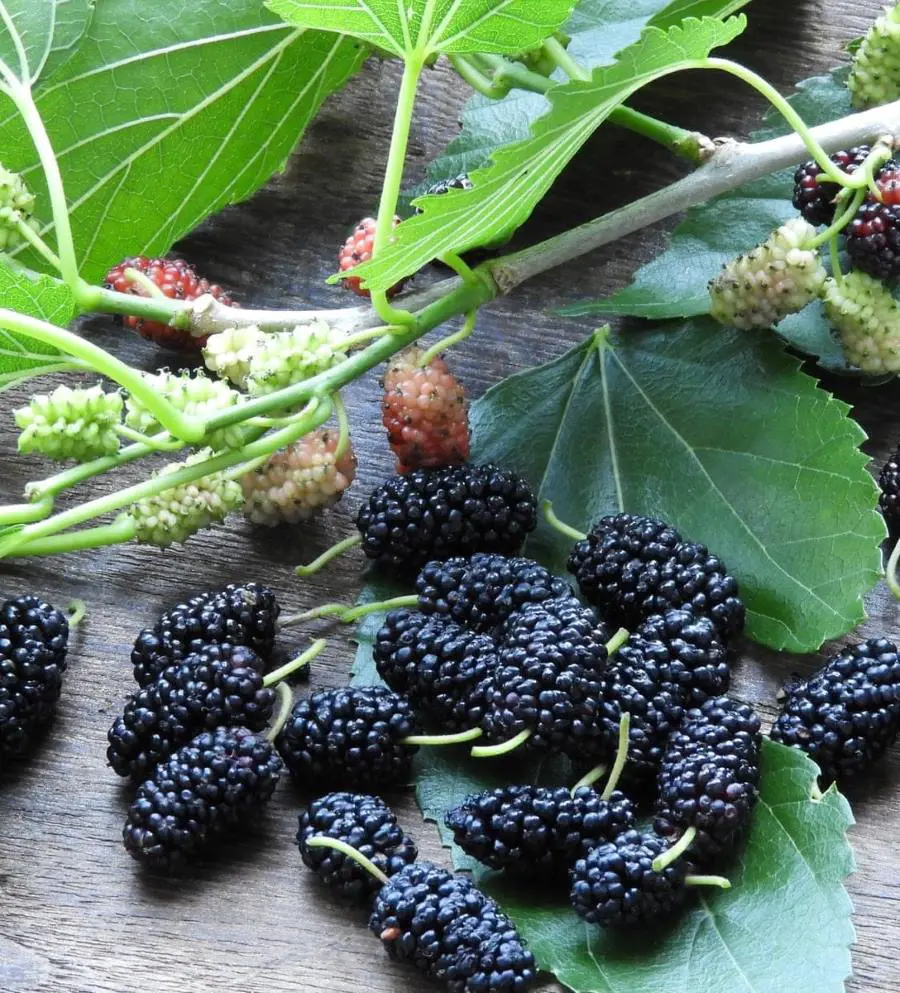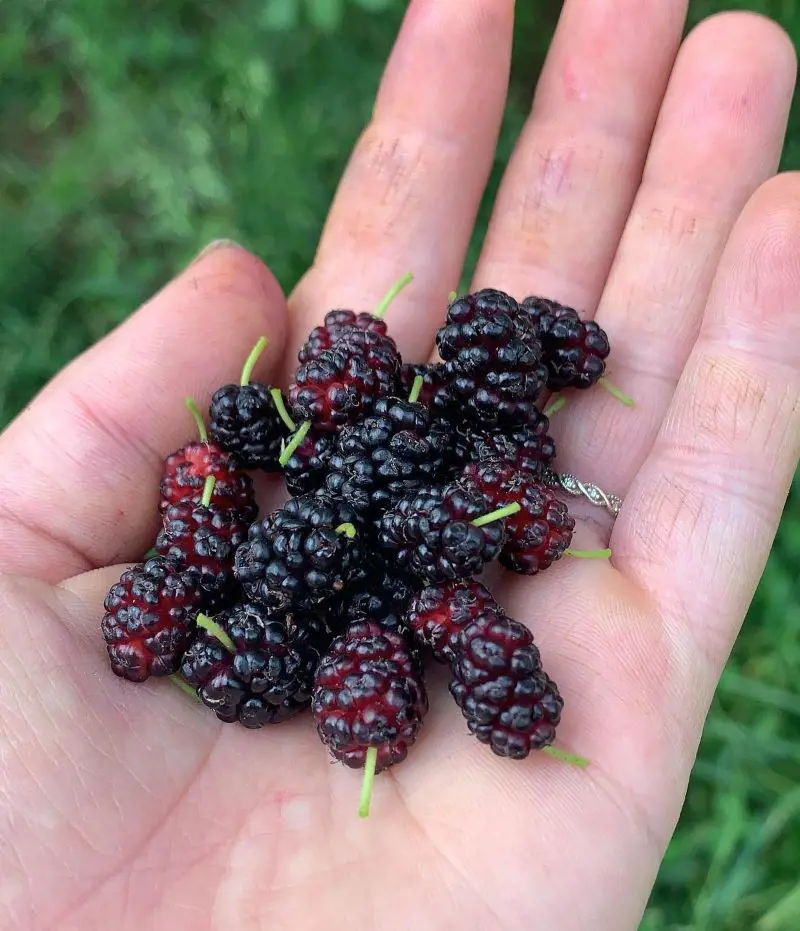10 Sweet Benefits of Mulberries

Mulberries are tiny fruits that grow on mulberry trees, scientifically known as Morus Alba. These trees are traditionally grown for silkworm cultivation, especially in Asia and North America. The fruits are usually small, round, or elongated, with a shape similar to that of blackberries.
Often enjoyed as fresh fruits, mulberries can also be used to create a variety of culinary creations like pies, tarts, jams, wine, and more. They are sweet and tart in flavor, and they are renowned for their impressive nutritional content, offering numerous health benefits.
1. Rich Source of Antioxidants

Mulberries are a rich source of antioxidants such as resveratrol, flavonoids, and anthocyanins. These powerful antioxidants combat harmful free radicals and protect against oxidative stress, preventing potential damage to DNA, fatty tissues, and proteins.
Furthermore, free radicals have been linked to cell damage and chronic diseases like heart problems, neurodegenerative disorders, and cancer. Research shows that mulberries have more antioxidants than many other fruits, making them a valuable tool in combating oxidative stress.
2. Help Control Blood Sugar Levels
Like many low glycemic index (GI) foods, mulberries also release sugars into the bloodstream gradually, helping to prevent sudden spikes in blood sugar levels and potentially reducing the risk of type 2 diabetes. This characteristic is particularly more prominent in the black varieties.
People with type 2 diabetes must be cautious when consuming carbohydrates to avoid rapid blood sugar spikes. Mulberries contain 1-deoxynojirimycin (DNJ), a compound that inhibits an enzyme in the gut responsible for carbohydrate digestion. However, further human studies are required before drawing firm conclusions.
3. Anti-Cancer Properties
Higher stress level in your body has been linked to causing oxidative damage in cells and tissues, which in turn increases the risk of cancer. For centuries, mulberries have been a staple in traditional Chinese medicine for their potential role in countering cancer.
Animal studies suggest that antioxidants in mulberry juice can lessen oxidative stress, potentially lowering the risk of cancer. However, it's important to note that this principle applies to fruits and vegetables in general, and there is no evidence to indicate that mulberries reduce cancer risk more effectively than other fruits or berries.
4. Improves Digestive health
Mulberries, rich in fiber, promote a healthy digestive system by supporting regular bowel movements and nourishing a diverse gut microbiota. So, enjoying these sweet berries can be a safe bet for maintaining a healthy digestive tract.
Moreover, the fiber found in mulberries assists in appetite control, leading to a sensation of fullness and aiding in weight management. With both soluble and insoluble fiber, they offer a comprehensive benefit to digestive health.
5. Supports Heart Health
Anthocyanins and resveratrol, present in mulberries, may play a crucial role in improving cardiovascular health by reducing inflammation, enhancing blood vessel function, lowering blood pressure, and regulating cholesterol levels.
If you're dealing with heart-related problems and high blood pressure, mulberries can be a valuable addition to your diet. However, it's advisable to consult your doctor before introducing any new and unfamiliar foods or supplements.
6. Good for Eye Health

As we age, our vision can deteriorate along with other bodily functions. Zeaxanthin and lutein, carotenoids present in mulberries, have been linked to a reduced risk of age-related macular degeneration (AMD) and cataracts, promoting overall eye health.
Moreover, the flavonoids in mulberries offer potential benefits in preventing a range of age-related eye conditions that develop gradually over several decades. Similarly, the vitamin C content in mulberries may help reduce the risk of developing cataracts.
7. Promotes Brain Health
Mulberries are rich in flavonoids, and these compounds can have significant advantages for long-term brain health, potentially reducing the risk of cognitive decline, which is associated with various cognitive diseases and disorders.
Research indicates that the antioxidants and neuroprotective elements in mulberries can help safeguard against age-related cognitive decline while enhancing memory and learning abilities. Embracing mulberries can help you stay sharp as you age.
8. Promotes Liver Health
Test-tube and animal studies have indicated that mulberry leaf extract could protect liver cells from harm and reduce liver inflammation. Many studies have shown the hepatoprotective properties of mulberry leaf against nonalcoholic fatty liver disease (NAFLD), although there is comparatively less research on mulberry fruit in this context.
Mulberries have the potential to enhance liver health, thanks to their iron content, which supports the liver. When consumed, they provide nourishment and cleanse the blood in the liver. This fruit aids in the removal of various toxins that can affect the liver, helping prevent the development of liver diseases.
9. Anti-Inflammatory Effects

Mulberry leaves are rich in anti-inflammatory compounds, including flavonoid antioxidants. Some research indicates that mulberry leaves may have the potential to fight against inflammation and oxidative stress, both of which are associated with chronic diseases.
A test-tube study using human white blood cells showed that extracts of mulberry leaf and its tea not only decreased inflammatory proteins but also notably reduced DNA damage resulting from oxidative stress. While these findings are promising, further research involving humans is necessary to confirm these effects.
10. Supports Bone Health
Mulberries are a rich source of Vitamin K, calcium, and iron, which contribute to the strengthening of bone tissues. These potent nutrients also lower the risk of osteoporosis, arthritis, and other degenerative disorders related to bone health. Vitam K further helps your body absorb calcium and build healthy bones.
In an animal study, researchers used mulberry leaf powder (MLP) and konjac glucomannan (KGM) flour to see how a mix of these can make bones stronger. The results show that the MLP/KGM mixture effectively reduces bone turnover and bone loss due to low calcium, leading to improved bone density.
Mulberry: Nutrition Facts

Fresh mulberries are rich in water, with 88% water content, and are low in calories, containing only 60 calories in a one-cup serving (140 grams). In terms of their fresh weight, they offer 9.8% carbohydrates, 1.7% fiber, 1.4% protein, and 0.4% fat.
Below, you'll find the nutritional components in a 3.5-ounce (100-gram) portion of fresh mulberries:
- Calories: 43
- Water: 88%
- Carbs: 9.8 grams (3% Daily Value)
- Sugar: 8.1 grams
- Protein: 1.44 grams
- Fiber: 1.7 grams (6% DV)
- Fat: 0.4 grams
- Calcium: 39 mg (4% DV)
- Iron: 1.85 mg (10% DV)
- Potassium: 194 mg (4% DV)
- Magnesium: 18 mg (4% DV)
- Vitamin C: 36.4 mg (60% DV)
- Vitamin K: 7.8 mcg (6.5% DV)
- Lutein + zeaxanthin: 136 mcg
- Vitamin E: 0.87 mg (5.8% DV)
- Vitamin B-6: 0.05 mg (5% DV)
Mulberries are packed with essential vitamins and minerals, especially vitamin C and iron. They also offer substantial amounts of potassium, as well as vitamins E and K.
Adding Mulberries to Your Daily Meals

You can easily incorporate mulberries into your daily meals by following these suggestions:
- Snack on them: Enjoy a handful of dried mulberries as a convenient and healthy snack.
- As a topping: Sprinkle freshly picked or dried mulberries on your morning cereal or yogurt for added flavor and nutrition.
- Refreshing smoothies: Enhance your vegan breakfast recipes with fresh or frozen mulberries in your smoothies for added fruity and nutritious goodness.
- Mulberry sauce: Cook fresh mulberries with a touch of sugar to prepare a delicious sauce that you can use as a topping for desserts, pancakes, or waffles.
- Mix into salads: Add fresh mulberries into your salads for a sweet and tangy twist.
- Bake into muffins or bread: Incorporate dried mulberries into your baking recipes, like muffins, bread, or oatmeal cookies. Or sprinkle them into your pancake recipe if you're a fan of pancakes.
- Mulberry smoothie bowl: Blend mulberries with yogurt or your choice of milk, and top with granola and other fruits for a satisfying breakfast or snack.
- Use in oatmeal: Add mulberries to your morning oatmeal for added flavor and texture.
- Infuse into tea: Make a cup of mulberry tea by steeping dried mulberries in hot water for a soothing and flavorful drink.
By adding mulberries to your daily meals using these ideas, you can effortlessly enjoy their unique taste and benefit from their nutritional value.
Mulberries: Possible Side Effects
Although mulberries are usually safe for most individuals, it's important to be aware of possible side effects:
- May lead to hypoglycemia
- May affect kidneys
- May cause gastrointestinal discomfort
- May slow down carbohydrate absorption
Tea extracts, including mulberry, can potentially aid in lowering carbohydrate absorption, offering potential benefits for weight management and diabetes. However, this property of mulberry may also impact the absorption of other nutrients, possibly resulting in adverse effects on the body.
Recent posts
Nutrition
Nutrition
Licorice Root: Benefits And Uses
You can spell it liquorice or licorice; this herb or root has been in use for centuries in most medicinal applications, as a natural sweetener and to enhance flavors. Regarding its origins, it comes from the root of the "Glycyrrhiza galbre" plant and...
Nutrition
Is Salmon Good For You? Nutritional Facts and Benefits
Salmon fish is a staple diet throughout the world, popular as a super food for its nutrients. Whether savored in sushi, poached, grilled, roasted, or pan-fried, salmon offers minerals and vitamins that contribute to healthy bodily functions. In addit...
Nutrition
25 Smoked Salmon Recipes That You Will Enjoy
Salmon is a silver-colored fish that is loaded with many nutrients, vitamins, and omega-3 fatty acids. Smoked Salmon is better for improving your health and reducing the risk of cancer, heart-related diseases, fights inflammation, reduces anxiety and...
Nutrition
Are Sausages Healthy? Nutrition And Health Benefits
Sausages are tasty in an addictive way, making them one of the most popular foods worldwide. You may have enjoyed this convenient food often, whether on a bun with mustard or grilled on a barbecue, the simple preparation methods are what makes its co...
Nutrition
20 Vegetables That Are Rich In Iron
Iron is essential for our bodies to function well. When we don't get enough iron, we often feel weak and tired. It's important to address iron deficiency early by eating the right foods. Fortunately, many vegetables are rich in iron and can help prev...
Nutrition
15 Cauliflower Nutrition Facts And Health Benefits
Cauliflower, a cruciferous vegetable, resembles a white variation of its relative, broccoli. Like broccoli, it has closely bunched florets attached to a thick core, often surrounded by a few leaves. While white is the most common color, cauliflower i...







